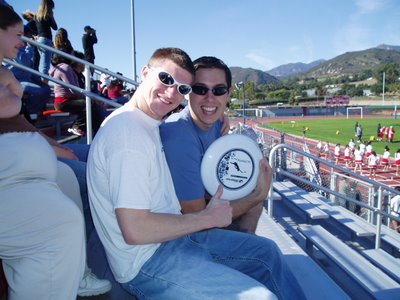(1) We went to her nephew's football game. But they lost :-(


(2) Then we played a little bit of frisbee - serious frisbee. :-)

(3) Then Elizabeth and I went to the beach for a walk and felt the absolute freezing cold LA water once again :-)

(4) Then She and I went to the Coffee Bean and did some studying for about 3 hours straight. Seriously. She wouldn't even sit at the same table as me - yet again. :-( I guess she thinks she won't be able to get much work done cause she has to stare at me the whole time ;-)
(5) We went to the Palms restarant. Here at the Palms you make your own steak. Literally. They give you a raw slab of meat or fish - I got the NY strip and she got the Halibut - and you go to this big grill in the middle of the restaurant and grill it yourself. It's a manly man's place :-)

Sitting at the beach in December is not really all that shabby. Those that live in 'ol St. Louis, this is the life eh? ;-)

